
Petula Clark CBE is a British singer, actress, and songwriter. She started her professional career as a child performer and has had the longest career of any British entertainer, spanning more than 85 years.

"Downtown" is a song written and produced by English composer Tony Hatch. The 1964 version recorded by British singer Petula Clark became an international hit, reaching number one on the Billboard Hot 100 and number two on the UK Singles Chart. Hatch received the 1981 Ivor Novello award for Best Song Musically and Lyrically.
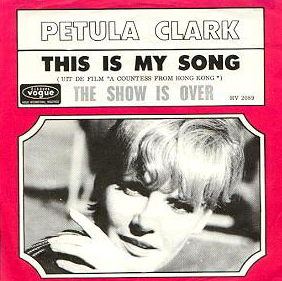
"This Is My Song" is a song written by Charlie Chaplin in 1966, and performed by Petula Clark.

Anthony Peter Hatch is an English composer for musical theatre and television. He is also a songwriter, pianist, arranger and producer.
Norman Newell was an English record producer, who was mainly active in the 1950s and 1960s. He was also the co-writer of many notable songs. As an A&R manager for EMI, he worked with musicians such as Shirley Bassey, Dalida, Claude François, Vera Lynn, Russ Conway, Bette Midler, Judy Garland, Petula Clark, Jake Thackray, Malcolm Roberts, Bobby Crush and Peter and Gordon.
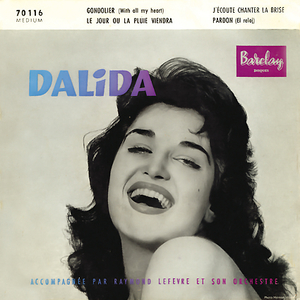
"Gondolier" is a song by the French singer Dalida, first released on EP in December 1957. It was her second major hit after "Bambino". Reaching No. 1 on both the La Bourse des Chansons chart and the Music Hall chart in France, it was the title song for Dalida's 1958 album Gondolier. The song also reached No. 1 on the Belgian and Canadian charts.
"For All We Know" is a soft rock song written for the 1970 film Lovers and Other Strangers, with music by Fred Karlin and lyrics by Robb Wilson and Arthur James. Both Royer and Griffin were founding members of the soft rock group Bread. It was originally performed, for the film's soundtrack, by Larry Meredith. The best known version of the song is by American pop duo the Carpenters which reached No. 3 on the US Billboard Hot 100 chart and No. 1 on the US Billboard Easy Listening chart in 1971. The song was also a hit for Shirley Bassey at the same time in the United Kingdom. It has since been covered by various artists, including Petula Clark.

"My Love" is a 1965 single release by Petula Clark which, in early 1966, became an international hit, reaching No. 1 in the US; the track continued Clark's collaboration with songwriter and record producer Tony Hatch.

"Anyone Who Had a Heart" is a song written by Burt Bacharach (music) and Hal David (lyrics) for Dionne Warwick in 1963. In January 1964, Warwick's original recording hit the Top Ten in the United States, Canada, Spain, Netherlands, South Africa, Belgium and Australia.
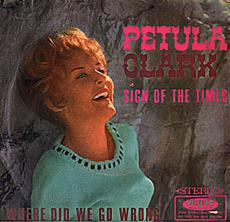
"Sign of the Times", also known as "A Sign of the Times", is a song performed by Petula Clark, featured on her album My Love and released as a single in March 1966. It was the follow-up to her #1 US hit "My Love," the title track from the aforementioned album, and it continued her association with writer/producer Tony Hatch and songwriter Jackie Trent. However, "Sign of the Times" had a more percussive sound than had been evident on Clark's previous singles, or than would become evident on her later ones. Clark discussed the song with Carl Wiser for Songfacts.com in 2013. "I loved it. It had a slightly different feel. 'A Sign of the Times,' I suppose you might expect some big political statement or something, but it was just a straight-ahead love song. I think Tony rather liked finding titles that made you think, like 'Don't Sleep in the Subway.' People would think, is it about drugs? Is it about this? And these were just straightforward songs. I like 'Sign of the Times.' I think it's a good song."

"I Know a Place" is a song with music and lyrics by Tony Hatch. It was recorded in 1965 by Petula Clark at the Pye Studios in Marble Arch in a session which featured drummer Bobby Graham and the Breakaways vocal group.

"I Couldn't Live Without Your Love" is a 1966 single written by Tony Hatch and Jackie Trent and recorded by Petula Clark. It was inspired by the affair the songwriters were having at the time. Clark has cited "I Couldn't Live Without Your Love" along with "Don't Sleep in the Subway" as her favorites of her hits. “I still love that one; I do it onstage with great joy,” Clark told the "Montreal Gazette" in 2017.

"Don't Sleep in the Subway" is a song written by Tony Hatch and Jackie Trent and recorded by British singer Petula Clark, for whom it was an April 1967 single release.
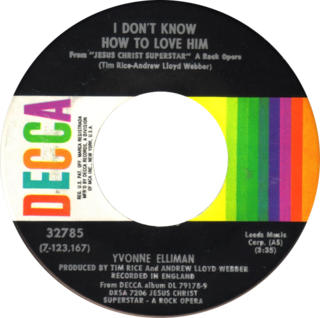
"I Don't Know How to Love Him" is a song from the 1970 album and 1971 rock opera Jesus Christ Superstar written by Andrew Lloyd Webber (music) and Tim Rice (lyrics), a torch ballad sung by the character of Mary Magdalene. In the opera she is presented as bearing an unrequited love for the title character. The song has been much recorded, with "I Don't Know How to Love Him" being one of the rare songs to have had two concurrent recordings reach the top 40 of the Hot 100 chart in Billboard magazine, specifically those by Helen Reddy and Yvonne Elliman, since the 1950s when multi-version chartings were common.
"Wedding Song (There Is Love)" is a title of a 1971 hit single by Paul Stookey: the song—which Stookey credits to divine inspiration— has since been recorded by many singers (with versions by Petula Clark and Mary MacGregor returning it to the Billboard Hot 100)—and remains a popular choice for performance at weddings.
Edith "Ditta" Einzinger was an Austrian pop singer who recorded under the stage name Lolita.
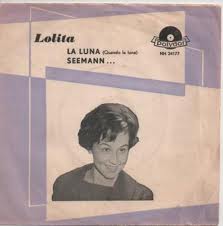
"Seemann (Deine Heimat ist das Meer)" (English translation "Sailor (Your Home is the Sea)") is a song originally written in German by Werner Scharfenberger (de) and lyricist Fini Busch (de). A 1959 German-language recording by Lolita became an international hit in 1960–61.
"Romeo" is a 1961 pop song recorded by Petula Clark.

"Kiss Me Goodbye" is a Les Reed/ Barry Mason composition recorded in 1968 by Petula Clark.













